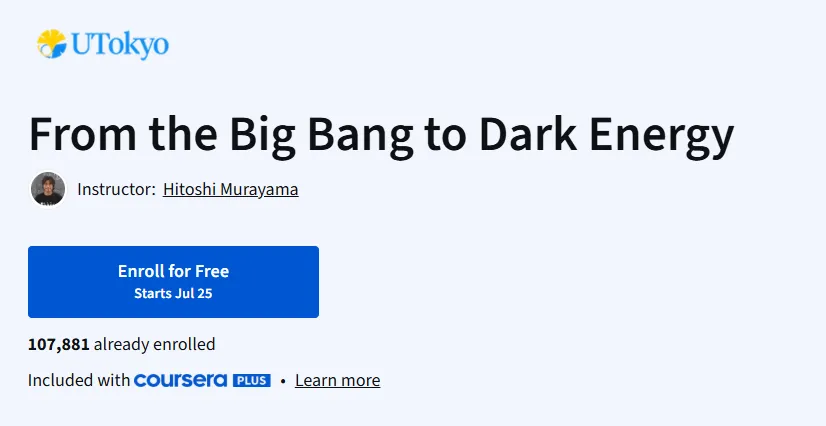What will you learn in From the Big Bang to Dark Energy Course
Understand the scientific basis for the Big Bang theory.
Explore key concepts of Einstein’s Special Relativity.
Grasp how early universe conditions led to the formation of galaxies.
Analyze the cosmic microwave background radiation.
Engage with thought experiments related to space and time.
Program Overview
Module 1: From Aristotle to Newton
⏱️ 1 week
Topics: Historical evolution of cosmological models, Newtonian mechanics, space-time concepts before Einstein.
Hands-on: Conceptual problem-solving quizzes.
Module 2: Einstein’s Special Relativity
⏱️ 1 week
Topics: Postulates of Special Relativity, simultaneity, time dilation, length contraction, Lorentz transformations.
Hands-on: Interactive simulations, thought experiments, and scenario analysis.
Module 3: Energy, Matter & E=mc²
⏱️ 1 week
Topics: Mass-energy equivalence, particle-antiparticle creation, early universe particles.
Hands-on: Case-based assignments and energy conversion estimations.
Module 4: The Expanding Universe
⏱️ 1 week
Topics: Redshift, Hubble’s Law, expanding space, implications for the Big Bang theory.
Hands-on: Calculations using astronomical data, expansion models.
Module 5: Early Universe & Cosmic Background
⏱️ 1 week
Topics: Evolution of the universe from 10⁻³⁵ seconds, cosmic microwave background, matter formation.
Hands-on: Analyze real CMB data visualizations and cosmological evidence.
Get certificate
Job Outlook
Relevance: Valuable for aspiring physicists, educators, and science communicators.
Academic Path: Great primer for advanced cosmology, astrophysics, and philosophy of science.
Career Roles: Research assistant, physics tutor, science journalist.
Skills Gained: Analytical thinking, conceptual understanding of time and space, public science communication.
Specification: From the Big Bang to Dark Energy
|
FAQs
- No prior physics or astronomy experience is required; the course introduces key concepts step-by-step.
- Basic understanding of high school-level science and math is helpful but not mandatory.
- Learners gradually explore the universe’s origin, structure, and evolution.
- Concepts are explained using clear visuals and examples.
- Beginners can build a solid foundation in modern cosmology.
- The course explains the Big Bang theory and the early universe.
- Learners study cosmic expansion, dark matter, and dark energy.
- Observational evidence from telescopes and satellites is introduced.
- Step-by-step examples link theory to current cosmological research.
- Knowledge gained provides a comprehensive understanding of the universe’s evolution.
- Learners explore gravity, relativity, and quantum concepts relevant to cosmology.
- Exercises and examples illustrate complex phenomena in a digestible way.
- Knowledge of physical laws helps explain galaxy formation and cosmic background radiation.
- Concepts are tied to real observations and experiments.
- Skills gained help learners understand ongoing discoveries in astrophysics.
- Knowledge enhances understanding of modern astronomy and physics.
- Concepts are relevant for science communication, research, or academic study.
- Understanding the universe’s structure improves critical thinking about complex systems.
- Awareness of recent discoveries connects learners to the scientific community.
- Completion demonstrates a strong conceptual grasp of cosmology.
- Estimated completion is around 4–6 weeks at a part-time pace.
- Weekly effort of 3–5 hours is generally sufficient for lectures and exercises.
- Regular engagement with visualizations and quizzes reinforces learning.
- Revisiting challenging concepts or exploring additional readings may require extra time.
- Consistent study ensures learners develop a thorough understanding of cosmology from the Big Bang to dark energy.





